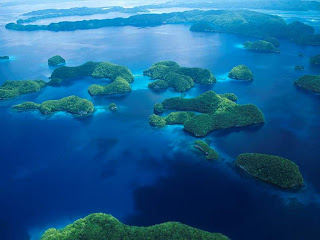In the video clip embedded above the environmental philosopher
David Abram talks about the way landscape no longer speaks directly to us. In his book
The Spell of the Sensuous, he writes that in oral cultures, ‘human eyes and ears have not yetshifted their
synaesthetic participation from theanimate surroundings to the written word. Particular mountains, canyons, streams, boulder-strewn fields, or grovesof trees have not yet lost the expressive potency and dynamism with which theyspontaneously present themselves to the sense. A particular place in the land is never, for an oral culture, just apassive or inert setting for the human events that occur there.
It isan active participant in those occurrences.’ These conclusions come after a description of the importance of location for Western Apachestorytelling. An ‘
agodzaahi narrative always beginsand ends with a statement explaining where it happened, using one of thelanguage’s evocative place names (which read like compressed poems). Abram cites the work of linguisticanthropologist Keith Basso, who found that these
place namesoccur with remarkable frequency in Apache discourse. I was intrigued by this, so I looked up theoriginal Basso article (in
CulturalAnthropology,
May 1988), where photographs of specificlocations are reproduced to demonstrate how well their Apache
place names fit: “Water flows inward underneath a cottonwood tree”; “White rocks lie abovein a compact cluster”; “Water flows down on top of a regular succession of flatrocks.”
According to Basso, ‘the great majority of Western Apache
place names currently in use are believed to have beencreated long ago by the “ancestors” (
nohwizá’ yé) of the Apache people. The ancestors, who had to travel constantlyin search of food, covered vast amounts of territory and needed to be able toremember and discuss many different locations. This was facilitated by the invention of hundreds of descriptive
place names that were intended to depict their referents inclose and exact detail.’ What's particularly interesting about these names (for readers of this blog) is that they assume aspecific point of view, like a
landscape: 'Western Apache
place namesprovide more than precise depictions of the sites to which the names may beused to refer. In addition,
place names implicitly identify positions for viewing theselocations: optimal vantage points, so to speak, from which the sites can beobserved, clearly and unmistakably, just as their names depict them. To picture a site from its name, then,requires that one imagine it as if standing or sitting at a particular spot,and it is to these privileged positions, Apaches say, that the images evoked by
place names cause them to travel in their minds.’ This travel is both “forward” (
bidááh) into space, and, following the memory of their ancestors' wanderings, “backward” (
t’ aazhi’) into time.





